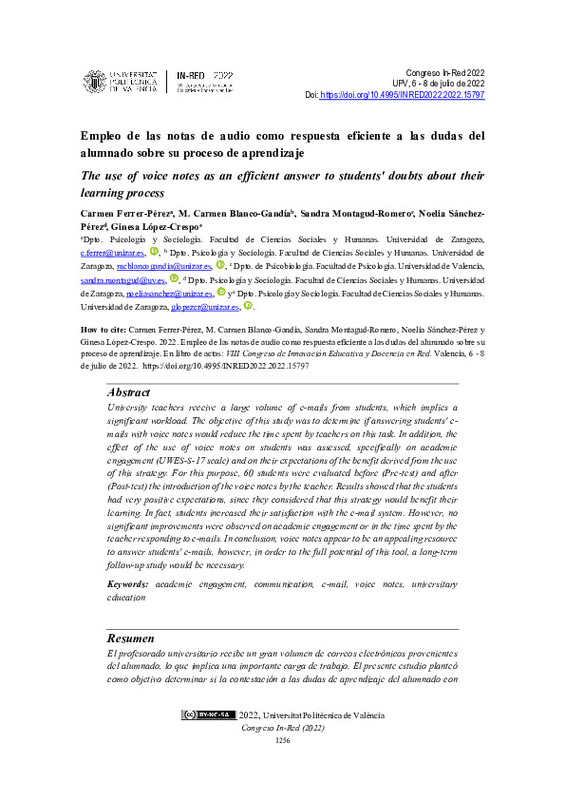JavaScript is disabled for your browser. Some features of this site may not work without it.
Buscar en RiuNet
Listar
Mi cuenta
Estadísticas
Ayuda RiuNet
Admin. UPV
Empleo de las notas de audio como respuesta eficiente a las dudas del alumnado sobre su proceso de aprendizaje
Mostrar el registro sencillo del ítem
Ficheros en el ítem
| dc.contributor.author | Ferrer-Pérez, Carmen
|
es_ES |
| dc.contributor.author | Blanco-Gandía, Mª
|
es_ES |
| dc.contributor.author | Montagud-Romero, Sandra
|
es_ES |
| dc.contributor.author | Sánchez-Pérez, Noelia
|
es_ES |
| dc.contributor.author | López-Crespo, Ginesa
|
es_ES |
| dc.date.accessioned | 2022-12-01T08:16:23Z | |
| dc.date.available | 2022-12-01T08:16:23Z | |
| dc.date.issued | 2022-10-28 | |
| dc.identifier.isbn | 9788413960173 | |
| dc.identifier.uri | http://hdl.handle.net/10251/190425 | |
| dc.description.abstract | [EN] University teachers receive a large volume of e-mails from students, which implies a significant workload. The objective of this study was to determine if answering students' emails with voice notes would reduce the time spent by teachers on this task. In addition, the effect of the use of voice notes on students was assessed, specifically on academic engagement (UWES-S-17 scale) and on their expectations of the benefit derived from the use of this strategy. For this purpose, 60 students were evaluated before (Pre-test) and after (Post-test) the introduction of the voice notes by the teacher. Results showed that the students had very positive expectations, since they considered that this strategy would benefit their learning. In fact, students increased their satisfaction with the e-mail system. However, no significant improvements were observed on academic engagement or in the time spent by the teacher responding to e-mails. In conclusion, voice notes appear to be an appealing resource to answer students' e-mails, however, in order to the full potential of this tool, a long-term follow-up study would be necessary. | es_ES |
| dc.description.abstract | [ES] El profesorado universitario recibe un gran volumen de emails provenientes del alumnado, lo que implica una importante carga de trabajo. El presente estudio planteó como objetivo determinar si la contestación a las dudas de aprendizaje del alumnado con notas de audio permitía disminuir el tiempo dedicado por el profesorado a esta tarea. Además, se evaluó su efecto sobre el alumnado, específicamente sobre su compromiso académico (escala UWES-S-17) y sobre sus expectativas del beneficio derivado de esta estrategia. Para ello 60 estudiantes fueron evaluados antes (Pre-test) y después (Post-test) de la introducción de las notas de audio por parte del docente. Los resultados muestran que los estudiantes tienen expectativas muy positivas, ya que consideran que esta estrategia puede beneficiar su aprendizaje. De hecho, se registró un aumento de la satisfacción con el sistema de correo electrónico. Sin embargo, no se redujo el número de horas dedicadas por el profesorado a contestar emails ni se registró un aumento en el compromiso académico. En conclusión, las notas de audio parecen un recurso muy prometedor para contestar a las dudas del alumnado por email, sin embargo, para poder evaluar todos los beneficios derivados sería necesario realizar un estudio de seguimiento a largo plazo. | es_ES |
| dc.description.sponsorship | Nos gustaría agradecer a la Universidad de Zaragoza (Vicerrectorado de Política Académica) por la financiación del presente estudio (PIIDUZ_21_130). | es_ES |
| dc.format.extent | 8 | es_ES |
| dc.language | Español | es_ES |
| dc.publisher | Editorial Universitat Politècnica de València | es_ES |
| dc.relation.ispartof | In-Red 2022 - VIII Congreso Nacional de Innovación Educativa y Docencia en Red | |
| dc.rights | Reconocimiento - No comercial - Compartir igual (by-nc-sa) | es_ES |
| dc.subject | Academic engagement | es_ES |
| dc.subject | Communication | es_ES |
| dc.subject | es_ES | |
| dc.subject | Voice notes | es_ES |
| dc.subject | Universitary education | es_ES |
| dc.subject | Compromiso académico | es_ES |
| dc.subject | Comunicación | es_ES |
| dc.subject | Correo electrónico | es_ES |
| dc.subject | Notas de audio | es_ES |
| dc.subject | Educación Universitaria | es_ES |
| dc.title | Empleo de las notas de audio como respuesta eficiente a las dudas del alumnado sobre su proceso de aprendizaje | es_ES |
| dc.title.alternative | The use of voice notes as an efficient answer to students' doubts about their learning process | es_ES |
| dc.type | Capítulo de libro | es_ES |
| dc.type | Comunicación en congreso | es_ES |
| dc.identifier.doi | 10.4995/INRED2022.2022.15797 | |
| dc.relation.projectID | info:eu-repo/grantAgreement/UNIZAR//PIIDUZ_21_130 | es_ES |
| dc.rights.accessRights | Abierto | es_ES |
| dc.description.bibliographicCitation | Ferrer-Pérez, C.; Blanco-Gandía, M.; Montagud-Romero, S.; Sánchez-Pérez, N.; López-Crespo, G. (2022). Empleo de las notas de audio como respuesta eficiente a las dudas del alumnado sobre su proceso de aprendizaje. En In-Red 2022 - VIII Congreso Nacional de Innovación Educativa y Docencia en Red. Editorial Universitat Politècnica de València. 1256-1263. https://doi.org/10.4995/INRED2022.2022.15797 | es_ES |
| dc.description.accrualMethod | OCS | es_ES |
| dc.relation.conferencename | IN-RED 2022: VIII Congreso de Innovación Educativa y Docencia en Red | es_ES |
| dc.relation.conferencedate | Julio 06-08, 2022 | es_ES |
| dc.relation.conferenceplace | Valencia, España | es_ES |
| dc.relation.publisherversion | http://ocs.editorial.upv.es/index.php/INRED/InRed2022/paper/view/15797 | es_ES |
| dc.description.upvformatpinicio | 1256 | es_ES |
| dc.description.upvformatpfin | 1263 | es_ES |
| dc.type.version | info:eu-repo/semantics/publishedVersion | es_ES |
| dc.relation.pasarela | OCS\15797 | es_ES |
| dc.contributor.funder | Universidad de Zaragoza | es_ES |








